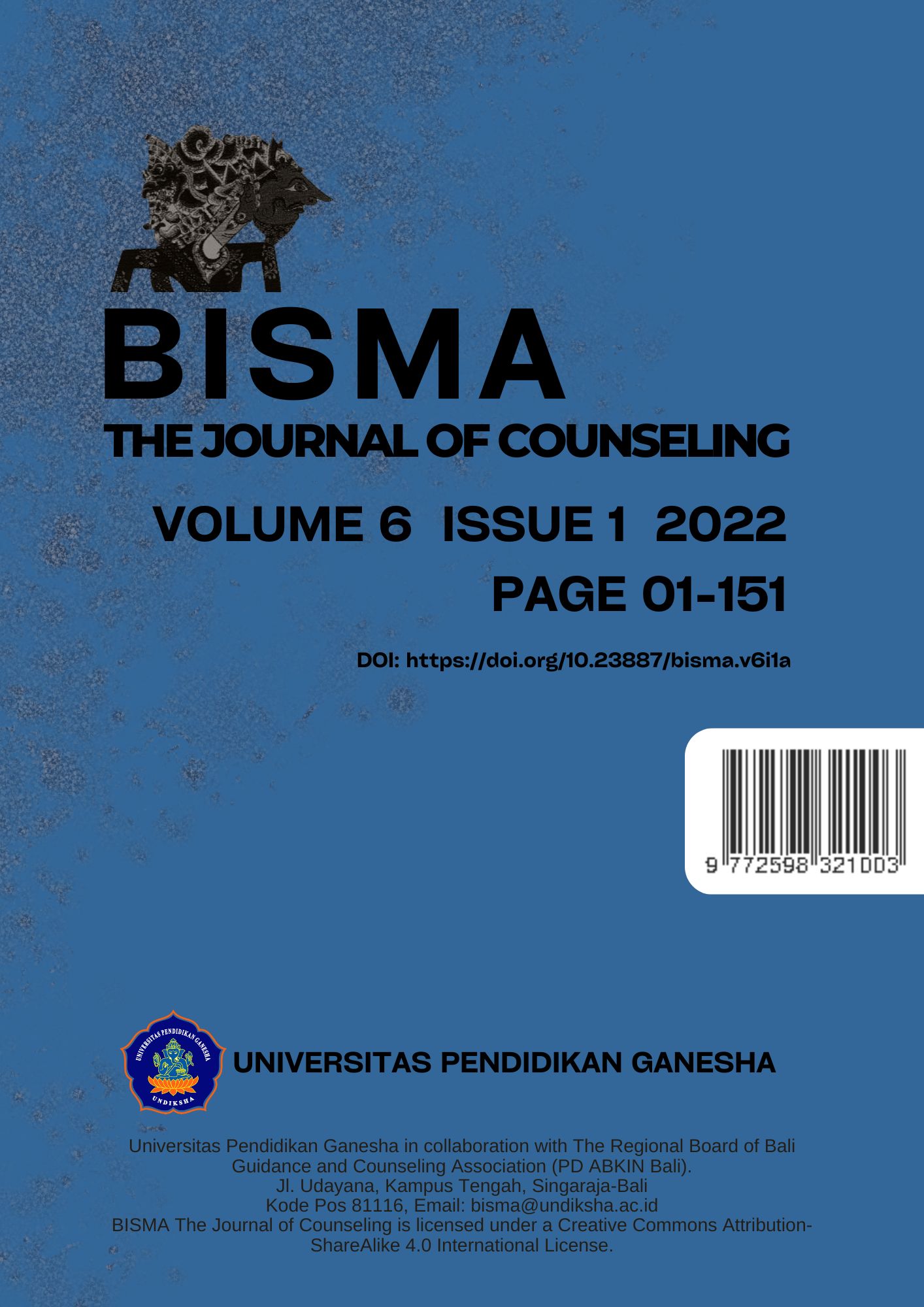A Student Counseling Study: The Internalized of Islamic Value in Daily Life
DOI:
https://doi.org/10.23887/bisma.v6i1.45550Keywords:
internalization islamic values, guidance and counseling, islamic boarding schoolsAbstract
The daily habits of students that have been formed so far in Islamic boarding schools that take place continuously produce positive habits that can be internalized in everyday life. In connection with this, the purpose of this study is to identify Islamic values that can be internalized in daily life, especially to deal with the Covid-19 Pandemic. Santri is a term for students who are in Islamic-based dormitories or commonly referred to as Islamic boarding schools which are cared for by Kyai and Bu Nyai. The population in this study are Islamic boarding schools located in East Java, especially the areas of Madura, Jombang and Probolinggo. This research uses constructivism paradigm with a qualitative approach. The method used is a case study that requires empirical data in Islamic boarding schools. The results of the data through in-depth interview techniques and documentation studies will be analyzed to further develop a narrative about the values that exist in Islamic boarding schools, how to handle them by teachers and reveal the needs of students which can be used as a basis for the development of guidance and counseling in Islamic boarding schools.
References
Kependidikan Islam UIN Sunan Kalijaga Yogyakarta, IX(1), 14.
Carandang, R. R., Shibanuma, A., Kiriya, J., Vardeleon, K. R., Marges, M. A., Asis, E., Murayama, H., & Jimba, M. (2019). Leadership and peer counseling program: Evaluation of training and its impact on Filipino senior peer counselors. International Journal of Environmental Research and Public Health, 16(21). https://doi.org/10.3390/ijerph16214108
Creswell, J. W. (2012). Educational research: Planning, conducting, and evaluating quantitative and qualitative research (4th ed). Pearson.
Dahlan, M., Bustami, M. R., Makmur, & Mas’ulah, S. (2021). The Islamic principle of ḥifẓ al-nafs (protection of life) and COVID-19 in Indonesia: A case study of nurul iman mosque of Bengkulu city. Heliyon, 7(7), e07541. https://doi.org/10.1016/j.heliyon.2021.e07541
Demirtaş-Zorbaz, S., & Ergene, T. (2019). School adjustment of first-grade primary school students: Effects of family involvement, externalizing behavior, teacher and peer relations. Children and Youth Services Review, 101(April), 307–316. https://doi.org/10.1016/j.childyouth.2019.04.019
Dogra, S. A., Rai, K., Barber, S., McEachan, R. RC., Adab, P., & Sheard, L. (2021). Delivering a childhood obesity prevention intervention using Islamic religious settings in the UK: What is most important to the stakeholders? Preventive Medicine Reports, 22, 101387. https://doi.org/10.1016/j.pmedr.2021.101387
Fathoni, A., Muhibbin, A., Arifin, Z., Habiby, W. N., & Ismail, M. E. (2021). Implementation of guidance and counselling services to Muhammadiyah elementary schools, Surakarta, provincial central Java, Indonesia. Kasetsart Journal of Social Sciences, 42(1), 177–184. https://doi.org/10.34044/j.kjss.2021.42.1.28
Houser, R. A. (2019). Counseling and Educational Research. Evaluation and Application. Fourth Edition. Sage Publications.
Junaidi, K. (2017). Sistem Pendidikan Pondok Pesantren di Indonesia (Suatu Kajian Sistem Kurikulum di Pondok Pesantren Lirboyo). Istawa: Jurnal Pendidikan Islam, 2(1), 95. https://doi.org/10.24269/ijpi.v2i1.364
McLeod, J. (2003). Doing counselling research (2nd ed). Sage Publications.
Nilan, P. (2009). The ‘spirit of education’ in Indonesian Pesantren. British Journal of Sociology of Education, 30(2), 219–232. https://doi.org/10.1080/01425690802700321
Patriadi, H. B., Bakar, Mohd. Z. A., & Hamat, Z. (2015). Human Security in Local Wisdom Perspective: Pesantren and its Responsibility to Protect People. Procedia Environmental Sciences, 28, 100–105. https://doi.org/10.1016/j.proenv.2015.07.015
Patton, K., Connor, J. P., Rundle-Thiele, S., Dietrich, T., Young, R. M. D., & Gullo, M. J. (2018). Measuring adolescent drinking-refusal self-efficacy: Development and validation of the Drinking Refusal Self-Efficacy Questionnaire-Shortened Adolescent version (DRSEQ-SRA). Addictive Behaviors, 81(January), 70–77. https://doi.org/10.1016/j.addbeh.2018.02.007
Petrowski, N., Cappa, C., Pereira, A., Mason, H., & Daban, R. A. (2021). Violence against children during COVID-19: Assessing and understanding change in use of helplines. Child Abuse and Neglect, 116(P2), 104757. https://doi.org/10.1016/j.chiabu.2020.104757
Ponterotto, J. G. (2005). Qualitative research in counseling psychology: A primer on research paradigms and philosophy of science. Journal of Counseling Psychology, 52(2), 126–136. https://doi.org/10.1037/0022-0167.52.2.126
Porter, J. W. (2020). Guidance counseling in the mid-twentieth century United States: Measurement, grouping, and the making of the intelligent self. History of Science, 58(2), 191–215. https://doi.org/10.1177/0073275319874977
Punna, M., Lappalainen, R., Kettunen, T., Lappalainen, P., Muotka, J., Kaipainen, K., Villberg, J., & Kasila, K. (2021). Can peer-tutored psychological flexibility training facilitate physical activity among adults with overweight? Journal of Contextual Behavioral Science, 21(April), 1–11. https://doi.org/10.1016/j.jcbs.2021.04.007
Rusho, M. A., Ahmed, M. A., & Sadri, A. M. (2021). Social media response and crisis communications in active shootings during COVID-19 pandemic. Transportation Research Interdisciplinary Perspectives, 11, 100420. https://doi.org/10.1016/j.trip.2021.100420
Sheperis, C., Young, J. S., & Daniels, M. H. (Eds.). (2010). Counseling research: Quantitative, qualitative, and mixed methods. Pearson.
Shiddiq, A. (2015). Tradisi Akademik Pesantren. TADRIS: Jurnal Pendidikan Islam, 10(2), 218. https://doi.org/10.19105/tjpi.v10i2.826
Shodiq, M. (2011). Pesantren dan Perubahan Sosial. Jurnal Sosiologi Islam, Vol. 1(No. 1), 12.
Thohir, A., Supriadi, D., Mulyana, Arifin, F., & Septiadi, M. A. (2021). The struggle of Freemasonry and Islamic ideology in the twentieth century during colonialization in Indonesia. Heliyon, 7(10), e08237. https://doi.org/10.1016/j.heliyon.2021.e08237
Ward, L. M., Hill, M. J., Picard, A., Olsen Harper, A., Chreim, S., & Wells, S. (2021). A process of healing for the Labrador Innu: Improving health and wellbeing in the context of historical and contemporary colonialism. Social Science and Medicine, 279, 113973. https://doi.org/10.1016/j.socscimed.2021.113973
Wekke, I. S., & Hamid, S. (2013). Technology on Language Teaching and Learning: A Research on Indonesian Pesantren. Procedia - Social and Behavioral Sciences, 83, 585–589. https://doi.org/10.1016/j.sbspro.2013.06.111
Yada, A., Björn, P. M., Savolainen, P., Kyttälä, M., Aro, M., & Savolainen, H. (2021). Pre-service teachers’ self-efficacy in implementing inclusive practices and resilience in Finland. Teaching and Teacher Education, 105. https://doi.org/10.1016/j.tate.2021.103398
Downloads
Published
Issue
Section
License
Copyright (c) 2022 Najlatun Naqiyah, Diajeng Retno Kinanti Putri, Dian Mutammima

This work is licensed under a Creative Commons Attribution 4.0 International License.








